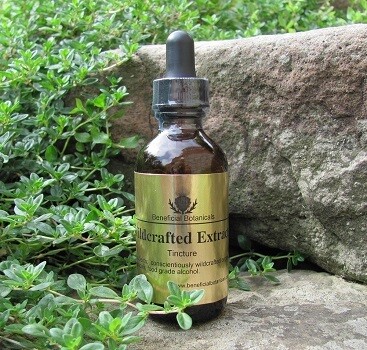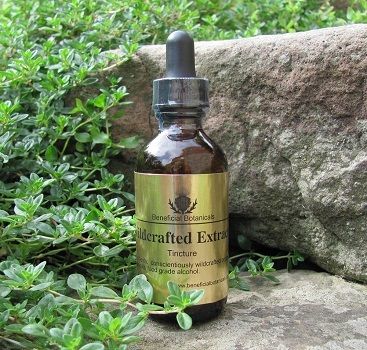Hawthorn Berry Tincture
Label: Beneficial Botanicals
Botanical Name: Crataegus sp. (oxyacantha)
Other Names: Quickthorn, Whitethorn
Parts Used: fresh berries
Organic: Yes Origin: USA
Menstruum: food grade alcohol
Alcohol by Volume: 32%
Tincture Ratio: 1:2
Known Uses: hypertension, cardiovascular disease (CVD), ischemic heart disease (IHD), angina pectoris, arrhythmias associated with Lyme disease
[tab name="Overview"]
Hawthorn has a long history of use, especially for cardiotonic activity. There is significant evidence to support its use in clinical cardiology and by the general public. Hawthorn is one of the oldest known medicinal plants used in European medicine; its cordial actions on the heart were first reported by first century Greek herbalist Cioscorides and later by Swiss physician Paracelsus (1493-1541). Other sources state that its clinical use for heart disease and cardiovascular disorders did not begin in Europe until the nineteenth century ref: Anschutz, 1900; Hobbs and Foster, 1990). Hawthorn has been extensively studied in Germany. More recently, studies and trials have been done with Hawthorn leaves, flowers, and berries. Both modern scientific and traditional literature indicate that Hawthorn berries are safe and effective in the treatment of blood pressure and circulatory issues, cardiac arrhythmia, and chronic heart failure.
A 2008 medical study, published in a German medical journal, proved that a drug containing hawthorn berry juice was tested against other heart and blood pressure medications, finding it to be safer as well as just as effective. This was a placebo-controlled human study involving patients ranging in age from 11 to 102 years old. The study was conducted in over forty medical practices in Germany during a two year period, specifically for orthostatic hypotension –dizziness when standing up after lying down or sitting for a long period of time.
The Journal of Agriculture and Food Chemistry published a medical study on hawthorn berry extract/tincture. This study tested the antioxidant, anti-inflammatory, gastro--protective, and anti-microbial effects of Hawthorn berry extract. A reduction in edema and inflammation was observed in rats as well as improvement of acute stress stomach ulcers. Antimicrobial testing of the extract revealed its moderate bactericidal activity, especially against gram-positive bacteria Micrococcus flavus, Bacillus subtilis, and Lysteria monocytogenes, with no effect on Candida albicans.
Constintuents: Flavonoids and oligomeric procyanidins are present in Hawthorn. The berries contain more hyperoside than the leaves and flowers, and the leaves and flowers contain more vitexin rhamnoside than the berries.
[tab name="Use / Dosage"]
Known Dosage (for Adults) - Read Precautions before dosing.
1 teaspoon twice daily, in the morning and before bedtime
Hawthorn has been shown in studies to have similar effects as an ACE-inhibitor drug. Besides numerous other benefits, the most known use is for its ability to improve the heart’s “pumping power” by increasing ejection fraction. Antioxidant flavonoids (OPCs / polyphenols) in the berries. In some studies, conclusions show that concentrated doses of Hawthorn berries may help dilate blood vessels, improve blood flow, and protect the blood vessels from damage. Hawthorn berry can be used as an initial therapy for persons with early-stage congestive heart failure, particularly before pharmaceutical drugs are required.
Arrhythmia - Hawthorn can be used to treat arrhythmia associated with Lyme Disease, as suggested by author and herbalist Stephen Buhner.
Chest Pain (Angina) - Flavonoids activate endothelium-derived relaxing factor and inhibit phosphodieterase, thereby increasing vasodilation (dilation of the blood vessels).
Ejection Fraction - Ejection fraction can be measured showing the amount of blood pumped by the cardiac muscle with each heart beat. If the ejection fraction number is too low, it can be an indication of tissue damage which may, over time, lead to heart failure.
High Cholesterol - Hawthorn berries are known to inhibit platelet aggregation and adhesion from its antioxidant effects.
Atherosclerosis - Thanks to its rich flavonoid content, Hawthorn can prevent formation of plaque and atherosclerosis which can cause chest pain, heart attack and stroke. Hawthorn berries also contain vitamins B-12, B-6 and folic acid which may reduce the risk of atherosclerosis by metabolizing and lowering levels of homocysteine linked to cardiovascular disease.
[tab name="Precautions"]
If you are not taking other prescriptions and do not have a history of heart failure, Hawthorn Berry in tincture form may be used for an extended period of time, however overdose can actually cause converse effects of arrhythmia as well as dangerously low blood pressure in some people.
The most common adverse effects are vertigo and dizziness. Hawthorn berry tinctures and capsules do not typically cause mild diarrhea that is sometimes experienced when drinking Hawthorn berry teas in excess.
Do not take this tincture if you are a pregnant woman or breast feeding. Children should not take Hawthorn Berry preparations.
Heart disease is a serious condition. Do not self treat heart conditions without telling your doctor. You should use Hawthorn Berry tincture under your healthcare provider’s supervision.
Herbal and Drug Interactions
Hawthorn should be used with caution when combined with other herbs and supplements that have cardiovascular effects such as Danshen, Epimedium, Ginger, Ginseng, Turmeric, and Valerian. Avoid use with cardioactive herbs such as Horehound and Shepherd’s Purse due to the unpredictability of effects and adverse effects. Do not take Hawthorn Berry tincture with antiarrhythmics, antihypertensives (vasodilators, ACE inhibitors, angiotensin receptor blokers, calcium channel blockers), cardiac glycosides (digoxin), vasodilators (phosphodiesterase type 5 inhibitors), and antihyperlipidemic agents.
Recent data suggests no notable interaction between Hawthorn and digitalis glycosides and standard therapy for chronic CHF, but caution is still advised until more definitive data is available.
[tab name="References"]
Natural News. 'Medical science and herbalists agree: hawthorn berries are a great heart food', April 26,2012; Donna Earnest Pravel.
Altern Med Rev. 1998;3(6):422-431. Miller AL. 'Botanical influences on cardiovascular disease.'
Natural Medicines Comprehensive Database
Arzneimittelforschung. 2005;55(8): 443-50. 'Efficacy and safety of a herbal drug containing hawthorn berries and D-camphor in hypotension and orthostatic circulatory disorders/results of a retrospective epidemiologic cohort sutdy,' B. Hempel, et al.
Journal of Agriculture and Food Chemistry. Sept. 10,2008; 56(17):7700-9.'Anti-inflammatory, gastroprotective, free-radical-scavenging, and antimicrobial activities of hawthorn berries ethanol extract,' V.M. Tadic, et al.
Ray Sahelian, MD. Raysahelian.com/heartfailure.html
American Family Physician. 2010 Feb 15;81(4):465-468. 'Effects of Hawthorn' Stephen Dahmer MD, Beth Israel Continuum Center for Health and Healing, New York, NY and Emilie Scott MD, University of California at Irvine Medical Center, Orange, CA.
[endtab]
These statements have not been evaluated by the Food and Drug Administration. The information provided here is intended to supplement, not substitute for, the expertise and judgment of your physician, pharmacist or other healthcare provider and should not be construed to indicate that the use of this herbal product is safe, appropriate, or effective for you. Consult your healthcare provider before taking this herbal product.


